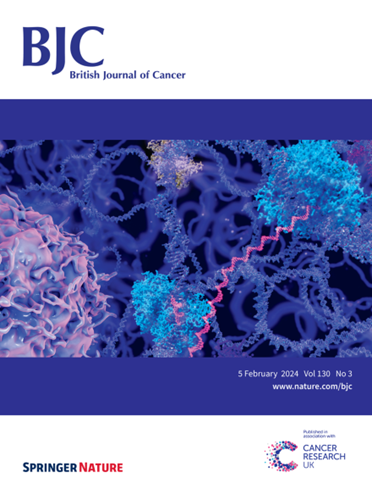诊断前饮用茶和咖啡与卵巢癌诊断后的存活率:卵巢癌协会联合会的研究结果。
IF 6.4
1区 医学
Q1 ONCOLOGY
引用次数: 0
摘要
背景:茶和咖啡是世界上最常饮用的饮料。尤其是绿茶,它含有具有潜在抗癌作用的化合物,但它与卵巢癌患者生存期的关系还不确定:方法:我们利用卵巢癌协会联合会(Ovarian Cancer Association Consortium)10 项研究的数据,调查了确诊前饮用茶和咖啡与生存之间的关系。我们获得了多达 5724 名女性的茶(绿茶、红茶、草药茶)、咖啡和咖啡因摄入量数据。我们采用考克斯比例危险回归法估算了调整后的危险比(aHR)和95%置信区间(CI):结果:与不喝绿茶的妇女相比,每天饮用一杯或一杯以上绿茶的妇女总生存率更高(aHR = 0.84,95% CI 0.71-1.00,p-趋势 = 0.04)。在五项提供相关信息的研究中,卵巢癌特异性生存率也存在类似关系(aHR = 0.81,0.66-0.99,p-趋势 = 0.045)。根据临床或生活方式特征定义的亚组之间没有一致的差异,对生活方式的其他方面进行调整也不会明显改变估计值。我们没有发现咖啡、红茶或花草茶或咖啡因摄入量与存活率之间存在关联的证据:结论:所观察到的与诊断前饮用绿茶有关的现象表明,诊断后饮用绿茶可能会改善患者的预后。本文章由计算机程序翻译,如有差异,请以英文原文为准。
Pre-diagnosis tea and coffee consumption and survival after a diagnosis of ovarian cancer: results from the Ovarian Cancer Association Consortium
Tea and coffee are the most frequently consumed beverages in the world. Green tea in particular contains compounds with potential anti-cancer effects, but its association with survival after ovarian cancer is uncertain. We investigated the associations between tea and coffee consumption before diagnosis and survival using data from 10 studies in the Ovarian Cancer Association Consortium. Data on tea (green, black, herbal), coffee and caffeine intake were available for up to 5724 women. We used Cox proportional hazards regression to estimate adjusted hazard ratios (aHR) and 95% confidence intervals (CI). Compared with women who did not drink any green tea, consumption of one or more cups/day was associated with better overall survival (aHR = 0.84, 95% CI 0.71–1.00, p-trend = 0.04). A similar association was seen for ovarian cancer-specific survival in five studies with this information (aHR = 0.81, 0.66–0.99, p-trend = 0.045). There was no consistent variation between subgroups defined by clinical or lifestyle characteristics and adjustment for other aspects of lifestyle did not appreciably alter the estimates. We found no evidence of an association between coffee, black or herbal tea, or caffeine intake and survival. The observed association with green tea consumption before diagnosis raises the possibility that consumption after diagnosis might improve patient outcomes.
求助全文
通过发布文献求助,成功后即可免费获取论文全文。
去求助
来源期刊

British Journal of Cancer
医学-肿瘤学
CiteScore
15.10
自引率
1.10%
发文量
383
审稿时长
6 months
期刊介绍:
The British Journal of Cancer is one of the most-cited general cancer journals, publishing significant advances in translational and clinical cancer research.It also publishes high-quality reviews and thought-provoking comment on all aspects of cancer prevention,diagnosis and treatment.
 求助内容:
求助内容: 应助结果提醒方式:
应助结果提醒方式:


